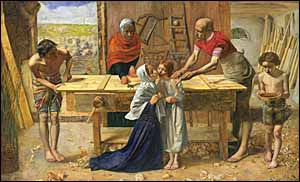
|
Old Testament
New Testament
Gospels
Acts
Paul's Letters
General Letters
Revelation
Topical Studies
Beginning the Journey (for new Christians). en Español

|
Old Testament
New Testament
Gospels
Acts
Paul's Letters
General Letters
Revelation
Topical Studies

|
Home
Bible Studies
Articles
Books
Podcasts
Search
Menu
Donate
About Us
Contact Us
FAQ
Sitemap
Day 26. The Boy Jesus (Luke 2:39-52)
Thursday (following the Fourth Sunday in Advent)
 Sir John Everett Millais, 'Christ in the House of His Parents' (1850), oil on canvas, 30 x 55 in, Tate Britain, London. |
Read in Your Bible: Luke 2:39-52
What was it like to raise Jesus the Messiah? Was he a perfect child? Did he ever make mistakes? Did he ever have to learn anything? Questions like these and dozens more have occurred to Christians.
Infused with the Grace of God (Luke 2:39-40)
"When Joseph and Mary had done everything required by the Law of the Lord, they returned to Galilee to their own town of Nazareth. And the child grew212 and became strong;213 he was filled with wisdom, and the grace of God was upon him." (Luke 2:39-40)
Jesus grew, but did he learn? He must have. He didn't start out from infancy with all knowledge -- he had "emptied himself" of omniscience when he became a man (Philippians 2:7). The real question we're asking is an attempt to probe the mystery of the Incarnation. Just how "human" was Jesus as a child?
Human toddlers learn by observing, by trial and error. We learn language by imitation and correction. We learn responsibility by parental rules and enforcement until those rules -- and eventually those values -- become internalized. Did Jesus learn this way, too? I expect so. Believing that Jesus learned like any other human child doesn't conflict with our belief in his sinlessness.214
Though Jesus had to learn like the rest of us humans, he was specially gifted by God. This verse tells us that he was "filled with wisdom" and that "the grace of God was upon him" -- that is, God blessed him in what he was doing.215
Annual Trip to Jerusalem for Passover (Luke 2:41-45)
We're not told all the stories of Jesus' childhood, though some early apocryphal writings are filled with bizarre stories of this time. Luke just tells us one story to help us understand how God's Spirit was working within Jesus even as a young boy.
Like families all over Israel, each year his parents made the pilgrimage to Jerusalem to celebrate the Feast of the Passover in the Holy City. Jesus is twelve years old, on the brink of manhood, preparing for induction as a full member of the religious community at age thirteen.216 This year, he is described as "the boy Jesus."217 Next year, he'll be considered a man.
Pilgrims to the feast in Jerusalem usually traveled in "a group of travelers or caravan,"218 since a person traveling by himself was in danger from bandits who might swoop down and ravage a lone traveler. The caravan back to Nazareth is made up of many of Mary's and Joseph's friends and relatives from Galilee, and they naturally suppose that Jesus is somewhere in the crowd. No doubt when they camp for the night and Jesus is nowhere to be seen, they become alarmed. By this time, they might be as much as 20 to 25 miles north of Jerusalem.
First, they search among the campers in their company. When they can't find him, they return to Jerusalem in a panic, probably leaving early the next morning and arriving in the city about nightfall.
Sitting among the Teachers in the Temple (Luke 2:46-47)
"After three days219 they found him in the temple courts, sitting among the teachers, listening to them and asking them questions. Everyone who heard him was amazed at his understanding and his answers." (Luke 2:46-47)
Where is Jesus? Deeply engrossed in discussion with the learned teachers and Scripture scholars.220 The listeners would be sitting on the ground at the feet of the teachers, who were also seated. The rabbinical style of teaching used questions on the part of the students, from which discussion would rise.221
In the course of the discussion, this intense boy of twelve is both listening and asking probing, insightful questions that indicate to all his depth of understanding.222 Everyone who heard Jesus on this occasion is struck by his grasp of the Scriptures.223
At age twelve, Jesus is listening to teaching in the temple during Passover. But 20 years or so later, he is the Teacher in these same courts, and his many, many hearers are still struck with his insight and authority.
My Father's House (Luke 2:48-50)
When his parents finally find him they are amazed224 -- and upset. Mary rebukes him. Jesus' answer tells us a lot.
"'Why were you searching for me?' he asked. 'Didn't you know I had to be in my Father's house?'225 But they did not understand what he was saying to them." (Luke 2:49-50)
We see the naïve astonishment that his parents would not know where he was, typical of a twelve-year-old, I suppose. But we also see an awareness of who he really is, Son of his Father, in his Father's house. According to verse 49 Jesus must be, had to be226 in his Father's house. He must be learning so that he might teach. He must!
Obeying His Parents (Luke 2:51a)
This glimpse into Jesus' boyhood concludes with verses 51-52.
"51 Then he went down to Nazareth with them and was obedient to them. But his mother treasured all these things in her heart. 52 And Jesus grew in wisdom and stature, and in favor with God and men." (Luke 2:51-52)
Jesus is sensing his call to obey the Father. But part of that obedience involves submitting to his earthly parents.
Many of us have learned how difficult it is to submit to those who aren't as intelligent as we are, or as spiritually acute. It can be hard. It can be grating. But it is also necessary -- at least for a time -- so that God can work on other things in our lives. It was necessary for Jesus. God's call on his life is clear, but it is not yet time to fulfill it. He must wait, learn, grow, and prepare himself for that time when he will enter into his ministry. I've met many who are in so much of a hurry to fulfill the call that they don't take time to prepare for it. A mistake.
The text describes four areas of growth227 during his growing up years.
Unique in all time and history, Jesus is the mediator between God and man (1 Timothy 2:5).
 Also available in book formats: PDF, Kindle, and paperback. |
How much we need God's grace, his favor, upon us. We need his grace to grow, to find our spiritual gifts, to learn his Word, to venture out in whatever kind of ministry God is leading us into. And we need his grace that covers our sins and sets us free. Grace is God's gift to us. Merry Christmas!
Prayer
Thank you, Father, for showing us Jesus as a boy so we can allow ourselves to take the time we need to grow. We're so impatient. Calm us, we pray. And let your grace rest heavy upon us, for we need you so much. In Jesus' name, we pray. Amen.
Discussion Question
Q26. (Luke 2:39-52) Why do you think Luke feels it is
important to tell a story from Jesus' boyhood. What do we learn about Jesus
from this? Why is taking time to grow and prepare so important? Why are we so
tempted to short-circuit it by our impatience?
https://www.joyfulheart.com/forums/topic/2101-q26-boyhood/
Endnotes
[212] "Grew," the Greek verb auxanō, "to become greater, grow, increase" (BDAG 151).
[213] "Become strong" (NIV) or "wax strong" (KJV) is the Greek verb krataioō, "become strong." It can refer to physical strength, as it probably does here, as well as psychological and spiritual strength (BDAG 564).
[214] 2 Corinthians 5:21; Hebrews 7:26; 1 John 3:5.
[215] Here, the common Greek noun charis, "grace" seems to mean "a beneficent disposition toward someone, favor, grace, gracious care/help, goodwill" (BDAG 1079, 2a).
[216] Marshall, Luke, p. 126 cites P. Aboth 5:21; and Strack and Billerbeck II, 144-147.
[217] Greek noun pais, "boy, youth, child, a young person normally below the age of puberty" (BDAG 750-751).
[218] Synodia, BDAG 973.
[219] "After three days" probably means "on the third day" -- one day traveling north to Galilee by caravan, one day returning south to Jerusalem, and then the third day searching until they found Jesus.
[220] "Teachers" (NIV) or "doctors" (KJV) is the common Greek noun didaskalos, "teachers." Here it refers to "scripture scholars" (BDAG 241).
[221] Marshall, Luke, p. 127.
[222] "Understanding" is the Greek noun synesis, "the faculty of comprehension, intelligence, acuteness, shrewdness" (BDAG 970).
[223] The Greek noun is existēmi, "be amazed, be astonished, of the feeling of astonishment mingled with fear, caused by events which are miraculous, extraordinary, or difficult to understand" (BDAG 350).
[224] "Astonished" (NIV), "amazed" (KJV) is the Greek verb ekplēssō, "to cause to be filled with amazement to the point of being overwhelmed," here "be amazed, overwhelmed, dumbfounded" (BDAG 308).
[225] The word rendered "business" (KJV) or "house" (NIV, RSV, etc.) is actually a pronoun. While the KJV translation is possible, the context suggests a place. In fact, the Greek pronoun represents a common Greek idiom referring to one's house (Marshall, Luke, p. 129; Robertson, Word Pictures in the NT, q.v.). BDAG 689, where several examples from classical and Koinē Greek are given. "In my Father's house" is preferable.
[226] The Greek word translated "had to be" (NIV) or "must be" (KJV) is the Greek infinitive dei, "to be under necessity of happening, it is necessary, one must, one has to, denoting compulsion of any kind" (BDAG 213-214). We see this word used a number of times in Luke to indicate Jesus' inner compulsion to seek out his destiny (Luke 4:43; 9:22; 13:33; 17:25; 19:5; 22:37; 24:7; 24:26; 24:44; 24:46).
[227] "Grew" (NIV) or "increased in" (KJV) is prokoptō, "to move forward to an improved state, progress advance" (BDAG 871).
[228] Wisdom" is sophia, "the capacity to understand and function accordingly, wisdom" (BDAG 1bβא).
[229] Hēlikia, "bodily stature" (BDAG 436, 3), however some see it as "increase in years."
[230] "Favor" is charis, here, "a beneficent disposition toward someone, favor, grace, gracious care/help, goodwill," here passive, that which one experiences from another (BDAG 10, 2b).
Copyright © 2026, Ralph F. Wilson. <pastor![]() joyfulheart.com> All rights reserved. A single copy of this article is free. Do not put this on a website. See legal, copyright, and reprint information.
joyfulheart.com> All rights reserved. A single copy of this article is free. Do not put this on a website. See legal, copyright, and reprint information.

